unit 2 homework
牛津译林版英语八年级上册Unit 2 同步语法讲解和练习

Unit 2数量的比较和副词比较级、最高级一. 语法讲解1.比较事物的数量a.我们用more…than, less…than, fewer…than来比较两种事物之间的数量关系。
其中more…than之间加可数名词的复数或不可数名词. eg: Tony has more friends than Jim.;less…than之间加不可数名词. eg: He eats less food than I for breakfast.;fewer…than之间加可数名词的复数形式。
eg: Simon has fewer oranges than Nancy.b.我们用the most…, the least…, the fewest…来比较三者或三者以上事物之间的数量关系。
其中most, fewest, least分别是many/much, few, little的最高级。
the most…表示“最….; 最多”,后既接可数名词又可接不可数名词. eg: Lily has the most points of the three girls.;the fewest表示“最少”,后接可数名词的复数形式.eg: Who picked the fewest apples today?。
the least表示“最少”,后接不可数名词。
eg: He has the least water.2.副词的含义副词用来说明动作或状态的特征,在句中可以修饰动词、形容词或副词的一类词。
eg: run fast结构为副词fast修饰动词run; very good结构为副词very修饰形容词goodso quickly结构为副词so修饰副词quickly. 注意:形容词在句中常修饰名词,并放在名词前3.构词法a.形容词变副词:(1).多数形容词词尾加ly. eg: quiet---quietly (2).以辅音字母加y结尾的形容词,变y为i加ly. eg: easy---easily (3).少数以e结尾的形容词,要去掉e再加ly. eg: true---truly. 但绝大多数以e结尾的形容词仍要直接加ly. eg: polite---politely注意:有些词既可以做形容词,也可以做副词:far; fast; hard; high; late; well等总之:形容词变副词通常加ly.请记住口诀:元e去e加,辅y改i加,le结尾e改yb.名词变形容词:(1).名词后加y. eg: health---healthy (2).名词后加ly. eg: friend---friendly(3).方位词后加ern eg: east---eastern; south---southern4.副词的比较级、最高级变化规律a.单音节副词后,直接加er或est. eg: high---higher---highestb.以不发音的字母e结尾的副词,在词尾加r或st. eg: late---later---latestc.以辅音字母加y结尾的副词,要变y为i加er或est. eg: early---earlier---earlierd.多音节或部分双音节词,在词前加more或most. eg: carefully---more carefully---most carefullye.不规则变化well—better--best; badly—worse--worst; far—farther—farthest二. 专项练习Ⅰ. 写出下列词的比较级和最高级(20*1’=20’)1. far_____________ _____________2. slowly____________ ____________3. badly___________ ______________4. well____________ _____________5. hard ___________ ______________6. quickly __________ ___________7. much___________ ______________ 8. little ____________ ____________9. high____________ ____________ 10. often __________ _____________Ⅱ. 用所给单词的正确形式填空。
冀教版六年级上册英语-Unit2Lesson11AlwaysDoYourHomework!

教学设计一、教学目标1. 知识目标(1)能够听懂、会说、会读本课的生词和重点句子。
(2)能够运用所学知识进行简单的日常交流。
(3)了解课文主题,培养学生的道德观念。
2. 能力目标(1)能够独立完成课后练习。
(2)能够运用所学知识进行情景交际。
3. 情感目标培养学生养成按时完成作业的良好习惯,树立正确的道德观念。
二、教学内容本课的主题是“Always Do Your Homework!”,主要讲述了学生小明因为没完成作业而受到老师的批评,以及他的反思和改正过程。
课文内容还包括了同学们对于作业完成的不同看法和经历。
三、教学重点与难点重点:本课的生词和重点句子,以及如何运用所学知识进行日常交流。
难点:如何正确使用情态动词“must”和“needn’t”以及不定冠词“a”和“an”。
四、教具与学具准备1. 教具:多媒体课件、黑板、粉笔。
2. 学具:课本、练习本、文具。
五、教学过程1. 热身(5分钟)(1)教师与学生进行简单的英语对话,询问学生们的周末活动。
(2)学生自由交流,分享彼此的周末经历。
2. 引入(10分钟)(1)教师播放课文动画,让学生初步了解课文内容。
(2)教师引导学生回答问题,概括课文大意。
3. 讲解(20分钟)(1)教师讲解新课的生词和重点句子。
(2)教师示范如何运用所学知识进行日常交流。
(3)学生跟读,模仿语音语调。
4. 练习(15分钟)(1)教师组织学生进行小组活动,运用所学知识进行情景交际。
(2)学生上台展示,教师点评并给予鼓励。
5. 巩固(10分钟)(1)教师布置课后练习,让学生独立完成。
(2)教师巡回指导,解答学生疑问。
六、板书设计板书Always Do Your Homework!板书内容:1. 生词:homework, always, must, needn’t, morning, evening, quickly, late2. 重点句子:Always do your homework on time.You must finish your homework before you watch TV.I needn’t do the dishes because my sister is home.七、作业设计1. 抄写生词和重点句子。
八年级上人教版Unit2知识点大全

知识点大全SA重要动词词组help with housework 帮忙做家务, read 阅读, read English books 读英语书,exercise 锻炼, watch TV 看电视, go shopping 去购物, go to the movies 去看电影,shop 购物,use the internet 使用互联网,基本句型1What do you do on weekends? 你周末做什么?I always/usually/often/sometimes watch TV.What does he/she do on weekends?He/She always/usually/often/sometimes helps with housework.分析:试分析句子结构。
基本句型2Do you exercise?简略肯定:Yes, I do.完整肯定:Yes, I usually/often/sometimes exercise.简略否定:No, I don’t.完整否定:No, I never/hardly ever exercise.分析:试分析句子结构。
思考:如果针对he/she提问,应该怎么问与答?语法:关于频率副词频率副词:一般用来表示动作或状态发生的频率。
用法:助动词/Be动词/情态动词之后,实意动词之前。
根据动作发生的频率由大到小排列依次为:always(总是)> usually(通常)>often(经常,常常)>sometimes(有时)>hardly ever (几乎不)>never (从不)重要辨析:hardly ever与hardly1)hardly ever是频率副词,用于描述动作或状态的频率。
e.g. I am hardly ever late for school. 我上学几乎不迟到。
e.g. Jack hardly ever does his homework. 杰克几乎不做作业。
人教版七年级下册英语《Unit2Whattimedoyougotoschool》词句精讲精练
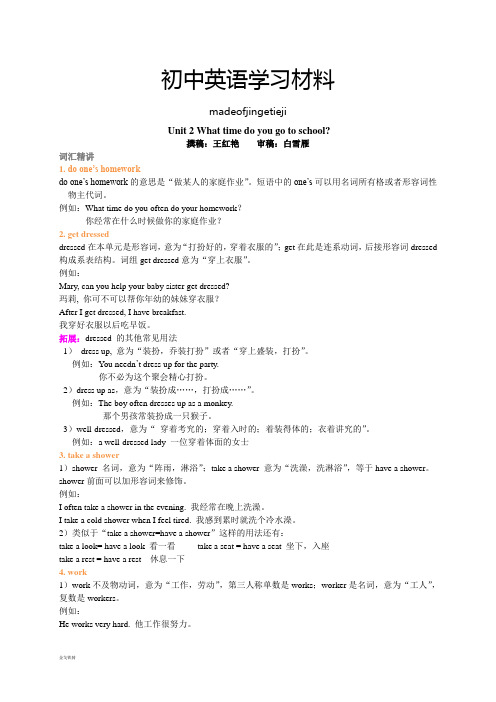
初中英语学习材料madeofjingetiejiUnit 2 What time do you go to school?撰稿:王红艳审稿:白雪雁词汇精讲1. do one’s homeworkdo one’s homework的意思是“做某人的家庭作业”。
短语中的one’s可以用名词所有格或者形容词性物主代词。
例如:What time do you often do your homework?你经常在什么时候做你的家庭作业?2. get dresseddressed在本单元是形容词,意为“打扮好的,穿着衣服的”;get在此是连系动词,后接形容词dressed 构成系表结构。
词组get dressed意为“穿上衣服”。
例如:Mary, can you help your baby sister get dressed?玛莉, 你可不可以帮你年幼的妹妹穿衣服?After I get dressed, I have breakfast.我穿好衣服以后吃早饭。
拓展:dressed 的其他常见用法1)dress up, 意为“装扮,乔装打扮”或者“穿上盛装,打扮”。
例如:You needn’t dress up for the party.你不必为这个聚会精心打扮。
2)dress up as,意为“装扮成……,打扮成……”。
例如:The boy often dresses up as a monkey.那个男孩常装扮成一只猴子。
3)well-dressed,意为“穿着考究的;穿着入时的;着装得体的;衣着讲究的”。
例如:a well-dressed lady 一位穿着体面的女士3. take a shower1)shower 名词,意为“阵雨,淋浴”;take a shower 意为“洗澡,洗淋浴”,等于have a shower。
shower前面可以加形容词来修饰。
例如:I often take a shower in the evening. 我经常在晚上洗澡。
九年级英语下册unit2全套教案

九年级英语下册unit2全套教案九年级英语下册unit2全套教案9B Unit 2 welunitI. Teaching objectives:To introduxt about having a roblp wwuma2. To talk about what a robot can dTo leaadvantagbII. Teaching procedure:: Warm-up: To raise students’get studg andalking about robots:① Have youblms?② What kind of robots do you know?③ Do you like robots? Why?④ What do youbots can du?⑤ Would you buy a robuture? Why?2: weluThe puaactivate student’s knowledgbots and generaAudadaword box aage 19. Make sure that all students understand the meaningases such as ‘do the laundry, explorer dangerous places’wn word2. Explaxt. Daniel is explaining to Amy what robots cado. Ask studlversaPagwAsk two studadversation andaurage studalk about if robots are harmful? Dividudgroups to discu① What do robots do harm to human beings?② Why do they do harm to human beings?Laleaain ideaLadad aaAudact ou: Useful exlaint: 不+可数名词“抱怨”;可数名词“抱怨的行动或话,投诉”lain:动词:complain to / about2. post:动词‘邮寄’:g for sb.III. Homework:Ruseful vocabulary and2. ComplxPreview reading(1)教学小结:学生基本能掌握对话,理解机器人能为人类做好多事。
Unit2Lesson11AlwaysDoYourHomework!(课件)冀教版英语六年级上册

一、根据汉语提示补全句子。 1.I_____(总是) do my homework. 2.I am_______(从不) late for school. 3.________(有时) she eats breakfast at 7:00. 4.He______(常常) walks to school.
HOቤተ መጻሕፍቲ ባይዱEWORK
1、复习课文,跟读三遍并背诵。 2、课文抄写一遍,默写一遍
(写在练习本上,不带汉语) 3、做完本课同步练习册
Thanks for
listening
二、连词成句。 1.help, your, do, you, mother (?) 2.but, my, I, bike, ride, sometimes (.) 3.do, you, to, school, walk (?) 4.I, often, clean, floor, the (.)
三、按要求写句子。 1.I wear dresses. (用never改写句子) 2.让我们用O代表often。(翻译) 3.Do you wear dresses? (作否定回答) 4.让我们用N代表never。(翻译) 5.Do you do your homework? (用always改写句子)
often
always
never
Look at the blackboard
YesY,Nesos.!m!I Ioentfitemevnesr.But Ycseloswe,maeanaelwrttihamdeyresfs!losIeorsri.d! e
my bike.
GALoyiJeooMLwSnduaeLOyftinae!rnotnODewksl'ytfLskuvghrIoaa,N'oetesero,panyd'mtrastndo.pmlmSnuf'orwos,oLedouytsdefodetarypo,ttcaiywrttoyemdunnhean'hoNssnuooteeonsye.euS.prsv.aoorhsykOee?udnulfeo?s?roto.l?uApr
冀教版小学英语四年级上册Unit 2 Lesson 7 Homework 同步练习
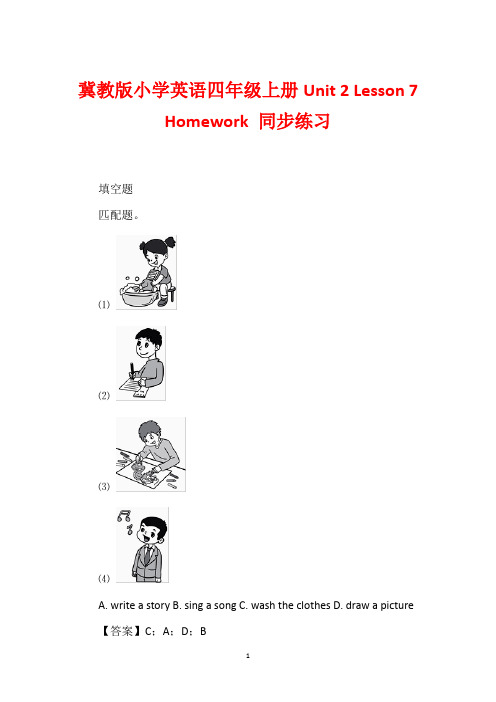
冀教版小学英语四年级上册Unit 2 Lesson 7Homework 同步练习填空题匹配题。
⑴⑵⑶⑷A. write a storyB. sing a songC. wash the clothesD. draw a picture【答案】C;A;D;B【解析】(1)图片1是一个女孩正在洗衣服,选项C洗衣服,可知图片1与选项C相符,所以答案是C.(2)图片2是一个男孩正在写,选项A写故事,可知图片2与选项A相符,所以答案是A.(3)图片3是一个人正在画画,选项D画画,可知图片3与选项D相符,所以答案是D.(4)图片4是一个女孩正在唱歌,选项B唱歌,可知图片4与选项B相符,所以答案是B.单词拼写I like to r a book.【答案】read【解析】句意:我喜欢.....书。
以字母r开头,根据句意,read 读,read a book读书,所以答案是read.单词拼写What d you like to do in the morning?【答案】do【解析】句意:在早晨你喜欢做什么?本句是特殊疑问句,主语是第二人称,助动词用do,所以答案是do.单词拼写These are m coats.【答案】my【解析】句意这些是....大衣。
以字母m开头,my我的,形容词性物主代词,后面接名词,所以答案是my.单词拼写She does her h in the afternoon.【答案】homework【解析】句意:在下午她做她的.....。
以字母h开头,homework 作业,所以答案是homework.选择题What do you do ________ the evening?A.atB.inC.on【答案】B【解析】句意:.....晚上你做什么?in the evening在晚上,固定词组,故选B.选择题He does ________ homework.A.heB.himC.his【答案】C【解析】句意:他做.....作业。
四年级上册英语优秀学案-Unit 2 Lesson7 Homework| 冀教版(三起)
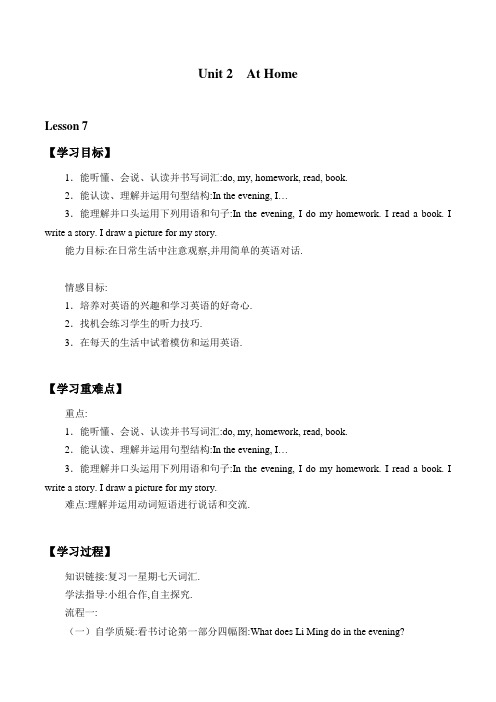
Unit 2 At HomeLesson 7【学习目标】1.能听懂、会说、认读并书写词汇:do, my, homework, read, book.2.能认读、理解并运用句型结构:In the evening, I…3.能理解并口头运用下列用语和句子:In the evening, I do my homework. I read a book. I write a story. I draw a picture for my story.能力目标:在日常生活中注意观察,并用简单的英语对话.情感目标:1.培养对英语的兴趣和学习英语的好奇心.2.找机会练习学生的听力技巧.3.在每天的生活中试着模仿和运用英语.【学习重难点】重点:1.能听懂、会说、认读并书写词汇:do, my, homework, read, book.2.能认读、理解并运用句型结构:In the evening, I…3.能理解并口头运用下列用语和句子:In the evening, I do my homework. I read a book. I write a story. I draw a picture for my story.难点:理解并运用动词短语进行说话和交流.【学习过程】知识链接:复习一星期七天词汇.学法指导:小组合作,自主探究.流程一:(一)自学质疑:看书讨论第一部分四幅图:What does Li Ming do in the evening?(二)合作释疑:播放光盘录音,跟读.讨论:What do you do in the evening?(三)展示评价:选择搭档并互相提问在家里都做什么.尽量使用新学的短语:do my homework, read a book, draw a picture, write a story.(四)巩固深化:用大写形式将下列句子写在作业本上:I READ MY BOOKI WRITE A STORYI DRAW A PICTUREI DO MY HOMEWORK复习句子,大声念出来.做动作.流程二:(一)自学质疑:打开课本,看游戏内容.(二)合作释疑:分组做游戏.(三)展示评价:展示结果.流程三:歌曲学习.流程四:(一)自学质疑:阅读第四部分.(二)合作释疑:分组做游戏.(三)展示评价:小组表演.【达标检测】填空:What do you do in the evening?I _____ my homework.I _____ a book.I _____ a story.I _____ a picture for my story.课堂小结:What have you learned today? 复习今天所学知识.Lesson 11 Always do your homework.一、教学目标:1、知识目标:学生掌握四会词always ,usually ,sometimes ,never及triangle ,circle ,square ,line;学生能理解Let’s put …for …的意义;2、能力目标:学生会运用句型Do you always …? 来调查身边同学做某事的频率,提高口语表达能力,并能根据调查结果绘制图表。
冀教版四年级上册英语Unit 2 Lesson 7 Homework 授课课件
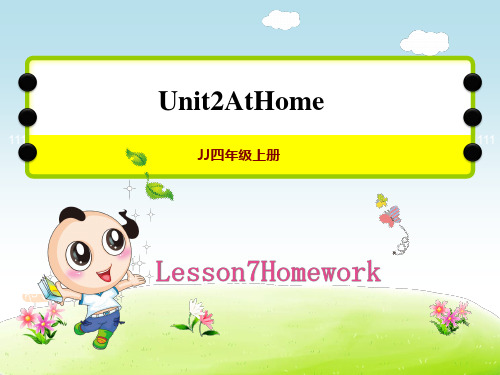
C. draw C.
C. our C.
本节课我们学习了以下知识,请同学们一定加强巩 固,以便能和同学们进行灵活交流哦!
重点词汇:evening, do, my, homework, read, book, write, draw, picture, for
重点句式:Intheevening, Idomyhomework. Ireadabook. Iwriteastory. Idrawapictureformystory.
一、单项选择。
1. ___A_____themorning,Igotoschool.
A. In
B. On
C. At
2. I___B_____myhomeworkintheevening.
ቤተ መጻሕፍቲ ባይዱ
A. isn’tdo
B. don’tdo C. doesn’tdo
点拨:主语是第一人称I,构成的否定句谓语为 “don’t+动词原形”。故选B项。
Tuesday
readabook
Wednesday drawapicture
Thursday writeastory
Friday
singasong
Groupwork. Actandsay.
Ireadabook.
Ireadabook. Iwriteastory.
Ireadabook. Iwriteastory. Isingasong.
B. for
C. at
点拨: draw…for…是固定搭配,意为“为……画……”,for后一 般接人,也可接物。故选B项。
二、圈出下列每组单词中不同类的一项。
1. A. book
B. picture
《Homework》_At Home PPT优秀课件
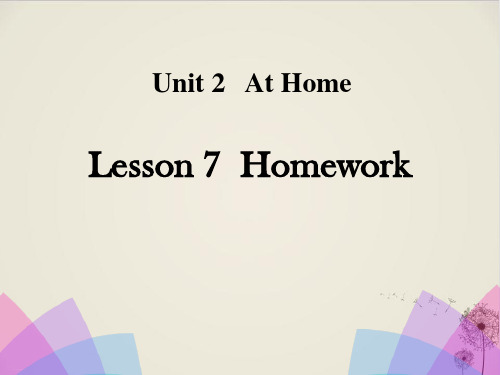
Unit 2 At Home
Lesson 7 Homework
《Homework》_At Home PPT优秀课件
课前热身 Sing a song:
He is wearing red clothes.
课前热身
复习回顾
话题导入
我们一周五天上学,但我们在家度过 的时间更多。今天我们学习一些谈论 在家庭活动时使用的单词和句子。
③my /maI/ (代词)我的
用法 my是形容词性物主代词,后面要跟名词,如: my book我 的书 my trousers我的裤子
例句 I love my mother.我爱我的妈妈。
重难点探究
重点词汇 ④homework /həʊmwɜːk/
(名词)家庭作业 例句 I do my homework after school. 我放学后做作业。
⑦picture (名词)图画;绘画;照片
同义词 photo 例句 The picture is very nice.那张图画很好看。
重难点探究
重点词汇 ⑧for (介词)为……;关于
例句 The gift is for you. 这个礼物是给你的。
短语 wait for等候 look for寻找 ⑨story (名词)故事
巩固练习
一、单项选择。
( )1. What do you do
the evening
Monday?
A. in; in B. on; in C. in; on
( )2. He usually reads a book
Monday
morning.
A. in
B. at
辽师大版英语六年级下册 Unit2

1.T: In Miss Lin’s class,Linda is absent today. Miss Lin is calling her. Let’s listen ,discuss and fill in the blanks.
a. _____ is absent today. ...
2.Show time
1.Play the recorder of the text. Let the Ss follow it.
2.Read the dialogue by yourself then read in pairs. Act the dialogue.
Step 3.Practice and Consolidation
1.Look, read and write
Who’s absent today?
Show time.
2.A joke
a.Play the recorder of the text. Let the Ss follow it.
several Ss to sum up what we have learned in this class.
学生活动及设计意图
批注
Step 1.Warming up
1.Greetings
2.Sing a song ‘ If you are happy’.
Step 2.Presentation and Drill
Listen and say.
1.T:In Miss Lin’s class,two students are absent today. What’s the matter with them?
人教版八年级上 Unit 2 复习提纲

一.重点单词1.housework(n.)家务/homework(n.)作业(不可数)2.twice (n.)两次→two(n.)二→second(num.)第二once(n.)一次→one(n.)一→first (num.)第一3.program(n.) →programs(n.)节目4.full(adj.)满的→full(adj.)饱的5.swing (v.)→swung(v.)摆动(过去式)→swing(n.)秋千6.maybe(adv. ) →perhaps也许;可能(近义词)7. hardly (adv) 几乎不(否定词)→hard (adj)硬的;困难的→hard(adv)努力地;猛烈地study/rain hard8.online(adj/adv)在线的→offline(adj)离线的9.least(adj/adv.)最少;最小→little(原型)→less(比较级)10.health (n. )健康→healthy(adj. )健康的→unhealthy不健康的11.through(prep.)→by(prep.)通过12.mind(v.)介意→mind(n.)心智13.die(v.)→dies(v.)三单→died(v.)过去式→dead(adj.)死的→death(n.)死亡14.write(v.)→wrote(v.)写→writer(n.)作家15.dentist (n.)→dentists(n.)牙医16.magazine(n.)→magazines(n.)杂志17.points(n.)重点;分数→point(v.)→pointed(v.)指(过去式)18.always(100%)总是→usually(70%)通常→often(50%)经常→sometimes (20%)有时→hardly ever(5%)几乎不→never(0%)从不二.重点短语Section A1.help (sb.) with housework帮助做家务help ( to ) do sth.2.on weekends在周末3.how often多久一次how soon多久以后how long多久;多长how far 多远4.hardly ever几乎从不5.once a week每周一次6.twice a month每月两次7.every day每天everyday 每天的8.be free有空/自由的9.go to the movies去看电影10.go online =use the Internet用互联网11.swing dance摇摆舞12.play tennis打网球13.stay up late熬夜;睡得很晚14.at least至少/ at most 最多15.have dance and piano lessons上舞蹈课和钢琴课16.go to bed early早点睡觉17.play sports进行体育活动18.be good for对……有好处be good at sth.擅长....be good with sb. 与...相处好19.go camping去野营20.not…at all一点儿也不……21.in one’s free time在某人的业余时间22.the most popular最受欢迎的23.such as比如;诸如24.go to the dentist for teeth cleaning去看牙医25.more than多于;超过/ less than少于26.want sb. to do sth.想让某人做某事Section B1.visit (visited) a science museum 参观博物馆2.Sb.+find +that从句. …发现……3.spend time with sb.和某人一起度过时光4.It’s+ adj.+ to do sth. 做某事是……的5.ask sb. about sth.向某人询问某事ask sb. (not) to do sth. 叫…不要做某事ask sb. for sth. 向某人要求…6. junk food 垃圾食品7. be full of= be filled with…装满的;饱的8. be busy doing sth.= be busy with sth. 忙于(做)某事9.be surprised to do对做某事感到惊讶be surprised at sth.对某事感到惊讶to one’s surprise 让某人吃惊的是10.keep/stay healthy= keep in good health保持健康11.by doing sth. / through sth. 通过做某事12.at least three or four times a week至少三或四次13.the best way to do sth.做某事的最好方式三、重点句子Section A1.How often do you exercise? 你多久锻炼一次?I exercise three times a week. 我一周锻炼三次。
新人教版八年级英语上 UNIT 2

1. Jenny ______ with him at that time, for I was having dinner with her in my A home. A. can’t have been B. mustn’t have been C. must have been D. may have been A have turned off the heating. 2. It is cold in the room. They ______ A. must B. ought to C. should D. could 3. — Someone is knocking at the door. B — Who ______ it be at this hour of day? A. may B. can C. must D. should B 4. I didn’t hear the phone. I ______ asleep. A. must be B.D must have been C. should be D. should have been 5. Johnson ______ be a policeman. He is much too short. A. may B. mustn’t C. should D. can’t 6. — Jack fell off a ladder yesterday, but he was all right. C — He is lucky. He ______ himself badly. A. can have hurt B. could have wounded C. might have hurt D. must have wounded 7. — Who told you the news? A — I don’t remember clearly. It ______ Mary. — It ______ Mary. She doesn’t know it. A. may have been; can’t beB. can be; mustn’t be C. must have been; can’t have beenD. may have been; may not be
四年级英语上册 Unit 2 At Home教案 冀教版(三起)

巩固检验Check for understanding:活动手册page20.
结束课堂教学Class closing
利用几分钟复习所学内容,教师做动作,学生猜短语:
watch TV, play on the computer, talk on the phone
教具
教学光盘、写有动词短语do my homework, read a book, write a story, draw a picture几张大纸,一个小的容器和几件服装,一些肥皂
教学过程
二次备课
开始上课和复习Class opening and review
问候Greeting利用卡片复习一周七天的单词
2. Lte’s do it!
(1)Look and write.看图片完成句子。
a. The phone is ___________ the chair.
b. The _______ is __________ the box.
c. The _______ is __________ the desk.
(1)出示Jenny从星期一到星期六的活动图,说说每天干什么:What does Jenny do everyday?
(2)l朗读歌词,理解词义。
(3)播放光盘录音,学生跟唱。
4.Lte’s play!
Group work. Act and say.读一读,解释游戏内容:第一个人说并做动作,下一个人说出上一个人的话并增加一句,第三个人把前两个人的话都说出来,再增加一句话。
课题
Lesson 7 Homework
课型
冀教版(三起)-英语-四年级上册-Unit2 Lesson7 Homework课堂作业(含解析)

冀教版(三年级起点)小学英语四年级上册Unit 2 Lesson 7 Homework一、判断出下列每组单词中不同类的一项。
1.选出不同项()A. doB. writeC. story2.选出不同项()A. FridayB. morningC. Sunday3.选出不同项()A. homeworkB. coatC. scarf4.选出不同项()A. pictureB. storyC. days5.选出不同项()A. washB. storyC. sing二、根据汉语意思选择正确的单词。
1周三()A. WednesdayB. TuesdayC. Thursday2.唱歌()A. songB. musicC. sing3.游戏()A. playB. gameC. do三、连词成句。
1.in,evening, I, do, my, homework,the (.)________2.picture,I,for,draw,a,my,story (.)________四、看图补充短语.看图,将短语补充完整。
(1)do my ________(2)draw a ________(3)________ a book(4)________ a story五、短文阅读.阅读理解I'm Kate. I'm a student. My favourite colour is yellow. I have a nice dress. I like it very much. Now, I'm wearing the dress and blue shoes. On Monday, I read a book. On Tuesday, I do my homework. On Friday, I sing a song. On Sunday, I play a game with my friends.阅读短文,判断句子正误。
九年级英语下册unit2全套教案

九年级英语下册unit2全套教案9BUnit2welcometotheunitI.Teachingobjectives:.Tointroducethecontextabouthavingarobottohelpwiththe workforhumans2.Totalkaboutwhatarobotcando3.TolearnsomeoftheadvantagesofrobotsII.Teachingprocedure:Step1:warm-up:Toraisestudents’interest,getstudentsthinkingandtalkingaboutrobots:①Haveyouseenrobotsinthefilms?②whatkindofrobotsdoyouknow?③Doyoulikerobots?why?④whatdoyouthinkrobotscandoforyou?⑤wouldyoubuyarobotinthefuture?why?Step2:welcometotheunit.Thepurposeofthispartistoactivatestudent’sknowledgeofrobotsandgenerateinterestsofthistopic.Askonestudent toreadthephrasesinthewordboxatthetopofpage19.makesurethatall studentsunderstandthemeaningsofthephrasessuchas ‘dothelaundry,explorerdangerousplaces’intheirownwords.2.Explainthecontext.DanielisexplainingtoAmywhatrobotscando.AskstudentstocompletetheconversationonPage19onth eirown.3.Asktwostudentstoreadtheconversationandcheckmistakes.4.Encouragestudentstotalkaboutifrobotsareharmful?Divi destudentsintogroupstodiscuss.①whatdorobotsdoharmtohumanbeings?②whydotheydoharmtohumanbeings?5.Listentothetapeforthefirsttimetolearnthemainideaof thecomicstrip.6.Listentothetapeforthesecondtimetoreadafterthetape.7.Asksomestudentstoactoutthecomicstrip.Step3:Usefulexpressions.complaint:不+可数名词“抱怨”;可数名词“抱怨的行动或话,投诉”complain:动词:complainto/about2.post:动词‘邮寄’:.postsomethingforsb.III.Homework:.Recitetheusefulvocabularyandcomicstrip.2.completesomeexercise.3.Previewreading教学小结:学生基本能掌握对话,理解机器人能为人类做好多事。
- 1、下载文档前请自行甄别文档内容的完整性,平台不提供额外的编辑、内容补充、找答案等附加服务。
- 2、"仅部分预览"的文档,不可在线预览部分如存在完整性等问题,可反馈申请退款(可完整预览的文档不适用该条件!)。
- 3、如文档侵犯您的权益,请联系客服反馈,我们会尽快为您处理(人工客服工作时间:9:00-18:30)。
unit 2 Relationship homework
1.第四周作业
Watch U2V1: What keeps people healthy and happy?
2.第五周作业
Each member of a group takes a task from Origin tracker, Practice describer, Reason explorer and Commentator.
Prepare for your role task according to the following table.
Project 2 Discussion Circle: Filial Love / Filial Piety
Mandatory Preview 1) Read the passage about filial piety on p19-20
2) Search online for the relevant information about “filial love/piety” in Chinese and the western civilizations.
For reference:
A.Xiao Jing or Classic of Xiào 《孝经》
B.The Analects of Confucius 《论语》
C.Di Zi Gui (Standards for Being a Good Student and Child)《弟子规》
D.24 Stories of filial piety in ancient China (二十四孝故事) and the video clip on the “new filial piety”
E.“Filial”-related scriptures in Bible
Role Task Requirements
Origin tracker Cultural tracking of the concept of filial love/filial piety in China and in the western world
文化寻根:中西方“孝”理念之溯源(建议:按照时间顺序进行“孝”理念发展的历史梳理。
)
Practice describer Description of the differences and common points between China and the west in the understanding and practice of filial love/piety and the ways of getting along with parents
中西对比:对“孝”的理解,践行以及与父母相处之道的异和同。
(建议:切忌杂乱堆砌,提炼出清晰的比较点,如:亲密度,顺服度,依赖度等)
Reason explorer Analysis of the reasons behind the differences of understanding and practice in filial love /pity
中西孝道观念差异背后的深层原因挖掘。
(建议:地缘环境,政治结构,经济体制,文化传统,代际价值观等)
Commentator Comments on the“24 stories of filial piety" in ancient China and the statement on what is due to our parents in the modern society
古训今评:
建议:1.传统24孝故事中哪些是愚孝应被批判摒弃(具体错在哪里),哪些值得今人借鉴并得以弘扬传承(具体好在哪里),切忌详述故事内容2.对现代社会个人如何对父母尽孝有何启发
3. 第六周作业
Preview the content on P22 and watch the Movie Guasha Treatment 《刮痧》(U2V4)for the cultural differences between Chinese and American ways of dealing with relationships.
Prepare a ppt-based presentation (`case study)
ppt 应包括如下内容:
首页:标题,小组号,组员,日期,课程名
正文:呈现案例(最好有视频链接,文字描述亦可),挖掘原因,提供态度末页:参考资料来源(网址,书名等)
每组汇报时长为5-6分钟;完成后老师按照评分表进行评分。
4. 第七周录音作业
In this part you are required to give a 2 minute continuous talk on the following sub-topics. (You are strongly suggested to practice your speaking a number of times before having your talk recorded. )
1)How can people practice filial piety in the modern society?
2)Share your relationship with your parents.(切忌空谈,可结合二三事回忆与反思)
3)SNSs in my life (可结合课本P25内容)
4)How to establish a positive interpersonal relationship
5. FIF口语训练
Practice every day。
